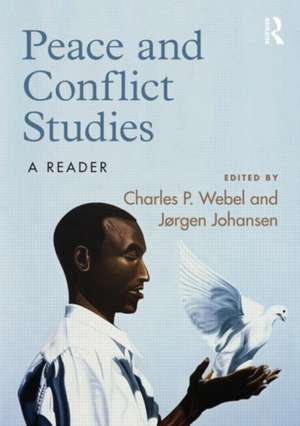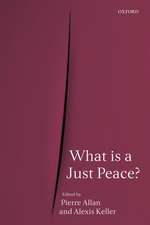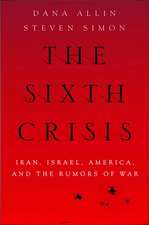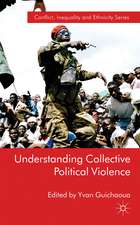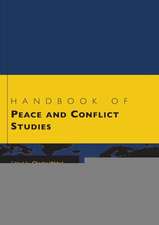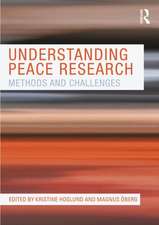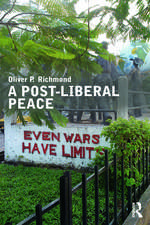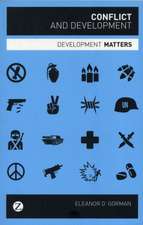Peace and Conflict Studies: A Reader
Editat de Charles Webel, Jorgen Johansenen Limba Engleză Paperback – 13 dec 2011
Presenting a range of theories, methodologies, and approaches to understanding peace and to transforming conflict, this edited volume contains both classic and cutting-edge contemporary analyses. The text is divided into six general sections:
PART I: Peace Studies, Peace Education, and Peace
PART II: Peace Theories and Peace Movements
PART III: The Meanings and Nature of Conflict
PART IV: Conflict Analysis, Transformation, and Prevention
PART V: Nonviolent Action and Political Change.
PART VI: Building Institutions and Cultures of Peace
With an extensive introduction, as well as recommendations for further reading and questions for the classroom, Peace and Conflict Studies: A Reader will be essential reading for students, teachers, and practitioners of peace and conflict studies, and conflict resolution. It is also highly recommended for students of peace operations, peacebuilding, sociology, international security and IR in general.
| Toate formatele și edițiile | Preț | Express |
|---|---|---|
| Paperback (1) | 401.07 lei 3-5 săpt. | +33.82 lei 4-10 zile |
| Taylor & Francis – 13 dec 2011 | 401.07 lei 3-5 săpt. | +33.82 lei 4-10 zile |
| Hardback (1) | 1024.57 lei 6-8 săpt. | |
| Taylor & Francis – 13 dec 2011 | 1024.57 lei 6-8 săpt. |
Preț: 401.07 lei
Preț vechi: 435.94 lei
-8% Nou
Puncte Express: 602
Preț estimativ în valută:
76.77€ • 83.42$ • 64.53£
76.77€ • 83.42$ • 64.53£
Carte disponibilă
Livrare economică 01-15 aprilie
Livrare express 15-21 martie pentru 43.81 lei
Preluare comenzi: 021 569.72.76
Specificații
ISBN-13: 9780415591294
ISBN-10: 0415591295
Pagini: 456
Ilustrații: 5 tables and 2 line drawings
Dimensiuni: 174 x 246 x 30 mm
Greutate: 0.82 kg
Ediția:1
Editura: Taylor & Francis
Colecția Routledge
Locul publicării:Oxford, United Kingdom
ISBN-10: 0415591295
Pagini: 456
Ilustrații: 5 tables and 2 line drawings
Dimensiuni: 174 x 246 x 30 mm
Greutate: 0.82 kg
Ediția:1
Editura: Taylor & Francis
Colecția Routledge
Locul publicării:Oxford, United Kingdom
Public țintă
Postgraduate, Professional, and UndergraduateCuprins
Introduction Part 1: Peace Studies, Peace Education, Peace Research and Peace A. What are Peace and Conflict Studies and Peace Education? 1. Shaping a Vision- The Nature of Peace and Conflict Studies Conrad Brunk 2. Four Major Challenges Facing Peace Education in Regions of Intractable Conflict Gavriel Salomon B. What is Peace? 3. Peace in International Relations Oliver Richmond 4. 2011 Global Peace Index 5. Thinking Peace Charles Webel 6. Positive and Negative Peace Johan Galtung Part 2: Peace Theories and Peace Movements A. Philosophical and Religious Contributions to Peace 7. Eternal Peace Immanuel Kant 8. Address to The Swedish Peace Congress in 1909 Leo Tolstoy 9. The Moral Equivalent of War William James 10. The Russell-Einstein Manifesto 11. A Human Approach to World Peace Dalai Lama B. Peace and Social Justice Movements 12. PEACE: A History of Movements and Ideas David Cortright 13. Introduction, from Peace Movements in International Protest and World Politics since 1945 April Carter 14. From Protest to Cultural Creativity: Peace Movements Identified and Revisited Nigel Young Part 3: The Meanings and Nature of Conflict A. What are Violence and Conflicts? 15. On Violence Hannah Arendt 16. Geneva Declaration on Armed Violence and Development 17. World Health Organization (WHO): An Internationally Accepted Definition of Violence 18. WHO: Violence Prevention: The Evidence, Overview B. The Reasons for Violent Conflicts and Terrorism 19. Letter to Sigmund Freud Albert Einstein 20. Why War? Sigmund Freud 21. UNESCO: Seville Statement on Violence 22. Psychological Contributions to Understanding Peace and Conflict Charles Wevel and Viera Sotakova 23. The Evil Scourge of Terrorism: Reality, Construction, Remedy Noam Chomsky Part 4: Conflict Analysis, Transformation, and Prevention A. Conflict Dynamics, Resistance, and Democracy 24. Protagonist Strategies that help end Violence Louis Kriesberg and Gearoid Millar 25. Nonviolent Geopolitics; Rationality and Resistance Richard Falk 26. The United States and the Prospects for Democracy in Islamic Countries Steven Zunes B. Reconcilliation 27. How do Post-Conflict Societies Deal with a Traumatic Past and Promote National Unity and Reconciliation? Andrew Rigby C. Disarmament 28. Disarmament and Survival Marc Pilisuk 29. Overcoming War, The Importance of Constructive Alternatives Christine Schweitzer Part 5: Nonviolent Action and Political Change A. Nonviolence as a Way of Life 30. Home Rule Mohandas Karamchand Gandhi 31. Pilgrimage to Nonviolence Martin Luther King, Jr B. Nonviolence as a Political Tool 32. How Nonviolence Works Brian Martin 33. Excerpts from, From Dictatorship to Democracy Gene Sharp 34. Waves of Nonviolence and the New Revolutionary Movements Jørgen Johansen Part 6: Building Institutions and Cultures of Peace A. Peacekeeping, Peace-Building, and Peacemaking 35. A Critique of Robust Peacekeeping in Contemporary Peace Operations Thierry Tardy 36. Social Entrepreneurs and Constructive Change: The Wisdom of Circumventing Conflict Ryszard Praskier, Andrej Nowak and Peter T. Coleman 37. Systems-Building before State-Building: On the Systemic Preconditions of State-Building Peter Halden 38. Gender and Peace: Towards a Gender-Inclusive, Holistic Perspective Tony Jenkins and Betty Reardon B. From Cultures of Violence to Cultures of Sustainable Peace 39. Competing Discourses on Aggression and Peacefulness Majken Jul Sørensen 40. Gender, Conflict, and Social Capital; Bonding and Bridging in War in the former Yugoslavia Maja Korac 41. Peaceful Societies and Everyday Behaviour Elise Boulding
Notă biografică
Charles P. Webel has recently taught at the Honors College of the University of South Florida, the University of New York in Prague, and the University of California at Berkeley, where he received his PhD. He is the author/editor of six books, including Terror, Terrorism and the Human Condition (2005); the Handbook of Peace and Conflict Studies (2007, co-edited with Johan Galtung), and Peace and Conflict Studies (2002, 2010, co-authored with David P. Barash).
Jorgen Johansen has 30 years' experience as a consultant and trainer in conflict prevention and resolution. He is a lecturer at the Peace and Development Research Institute, Gothenburg University, and at Syracuse University, New York, USA.
Jorgen Johansen has 30 years' experience as a consultant and trainer in conflict prevention and resolution. He is a lecturer at the Peace and Development Research Institute, Gothenburg University, and at Syracuse University, New York, USA.
Recenzii
'This volume is a much needed contribution to the study of peace and conflict in the contemporary world. Wide-ranging, interdisciplinary and topical, it renders peace and conflict studies relevant beyond the immediate post-Cold war era into the twenty-first century.' - M.K. Flynn, University of the West of England, Bristol
Descriere
Peace and Conflict Studies: A Reader is a comprehensive and intensive introduction to the key works in this growing field.
